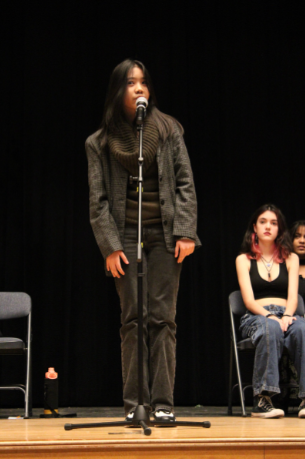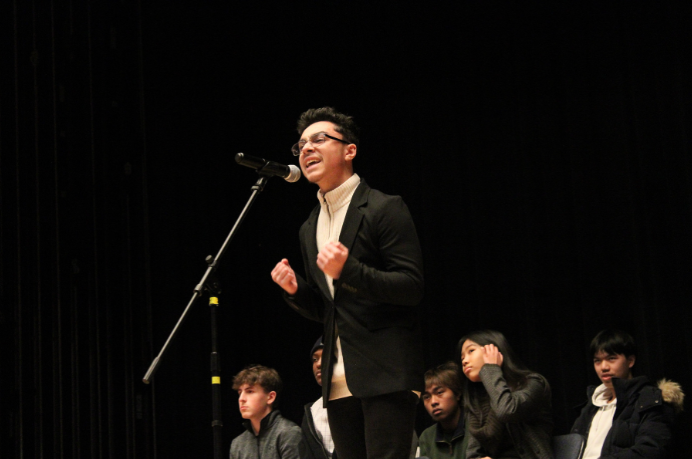
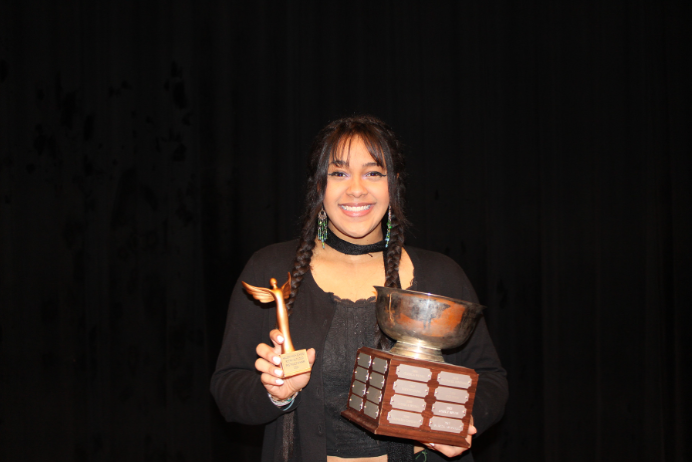
Daniel O’Toole contributed to this article.
Poetry Out Loud (POL) is an annual nationwide competition where students in grades 9-12 all participate. In POL you compete against your peers through reciting poems you pick yourself. Every student in the school recites their poem in front of the class, and the person with the best recitation moves on to compete against the winners of other classes in the same period.
The competition at MHS also honors former special education teacher Dave Holland. In the past, a tradition at MHS POL finals was a performance from Holland, one that accuracy judge Yahaira Marquez is very fond of. “I remember he would get on stage every year and make a performance out of his poems, whatever it is that he chose, and it was always such a highlight of the Poetry Out Loud finals competition. It was like, what will he do this year?” Holland sadly passed away in 2016, since then, the teacher competition has been to honor Holland. “You could feel his love for what he was doing, so keeping his legacy alive that way and having our staff members participate is special,” explained Marquez.
This year, the finals had 14 competitors, Bruan Memeus, Sean Retotal, Taliyah Lauture, Thomas Conti, Addison McWayne, Jiaxing Chen, Rashmi KC, Samira Borrero, Samantha Cuellar Ruiz, Ryan Coggswell, Oscar Luc. Along with the third-place winner Cathen Fontanilla, second-place winner Natalie Keating, and first-place winner Makeila Scott, who represented MHS in the regional competition.
For some, POL isn’t looked at very positively and many dislike it. However, POL does have its upsides. “I think POL’s important. It gives a different assessment for students to show what they can do to analyze literature that goes beyond writing an essay. We in the department try to give as much differentiation and variety of ways our students can demonstrate what they’ve learned in their growth and POL is one of them. I know that it pushes students outside of their comfort zone, but that’s where we get growth when we’re challenged in certain ways, and pushed outside of our comfort is where we see this is what we can do. We sometimes surprise ourselves with what we can achieve at those points. I think it is important and I think it’s an important way for students to also realize that challenge isn’t a bad thing,” said Marquez.
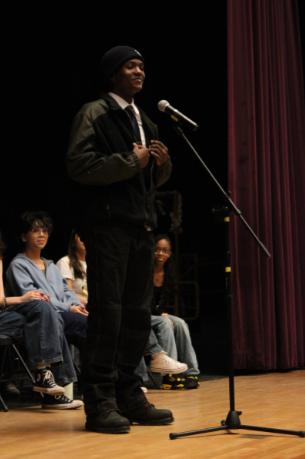
Preparing for your recitation is very important. Many practice in different ways, second place winner Natalie Keating chose to use her past experiences and those around her to help. “I’ve been doing theater basically my whole life, so I have a lot of experience with performing and speaking in front of crowds, but it was a new experience to memorize a poem and perform it as a poem. So I mainly prepared by practicing with friends and with family,” said Keating.
It’s easy to get nervous before performing, but instead, Keating chose to take the opportunity to appreciate the challenge she got from her peers. “It was exciting to see how each level had more people that I was really impressed with. Of course, every round everyone was trying their hardest and it’s impressive to stand in front of an audience and perform regardless, but it really felt like the stakes were rising each round.”
Midway through the competition, the teachers’ round takes place. Five teachers recite poems of their choice to the audience, and a winner among the teachers is chosen after the last teacher’s poem. This year, one of the participants was Evan Mauser.
“I’m always interested in which faculty are going up on stage because it’s different every year. I approach it like the students do, I’m going to try it out, and let’s see how well I can do. I feel like even though I’m not an English teacher, I want to be part of the whole situation. This is a challenge and I can do this and maybe it’s fun. Maybe I’ll find a good poem that resonates with me,” Mauser explained.
“Hopefully when students do it, they’re getting something out of it. Whether it be talking in front of people or it be preparing something because I think you don’t have to be good at poetry in your life because you may never look at a poem again. But there are aspects to the Poetry Out Loud situation that I think will help later on whether it’s presenting in front of colleagues or having to memorize something or other theater,” said Mauser.
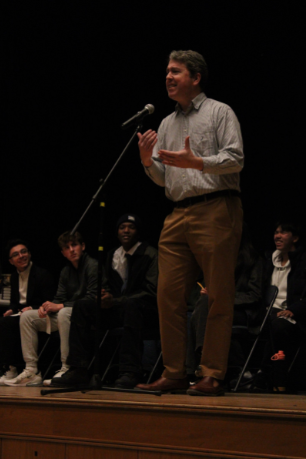
Soon after the teachers’ round, the students started up again and picked up the pace. Soon the contest was over and the winners were announced. Third-place Cathen Fontanilla, second-place winner, Natalie Keating, and first-place winner, Makeila Scott. “I do a lot of public speaking clubs, so I’ve worked really hard, especially with poem recitation, since that’s what I do in the program. I was like if I don’t win, that’s totally fine, but how cool would it have been for this to just culminate my senior year? Winning with a poem that means so much to me and really resonates with me so overall it was fun,” said Scott.
“I’m not the most religious, but I do follow religion, which is just one aspect of why I pick the poems I recited, but really, why I picked it is, now more than ever, we’re just becoming so divided, not just as a country, but also just from morals and values shown in both of the poems I chose. First, “My Thoughtless Cruelty” by Charles Lamb, is about why we’re human, and why we are different from other animals. We have the ability to reason, the ability to have empathy. And that’s exactly what the poem is about. It’s about having empathy for the smallest of creatures. Same thing with “The New Colossus” by Emma Lazarus. It’s all about uniting people. I mean, the entire poem is about bringing people together to teeming shores. So that’s really why I picked both of those,” said Scott.
With POL being an experience everyone at MHS goes through, it’s easy for it to become a bonding experience with others. “Poetry Out Loud is a competition and essentially, you’re competing with other people. Just sitting in those chairs, I made a new friend. Being able to both be sitting up there like, oh my gosh, we have to recite these poems, this is horrible. You’re going through the same thing and we’re bonding over that. I think more of a sense of community, you’re just able to connect with other people that you didn’t know even had a passion for expression. I didn’t even know Bruan wanted to recite a poem. It was so fun being able to recite it with him and just talk about him with the process,” said Scott.
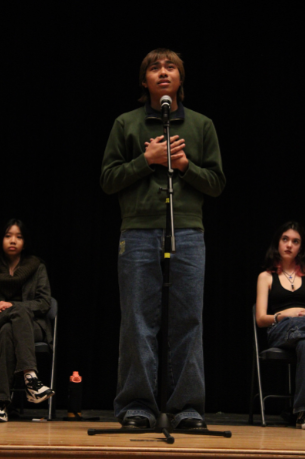
Having won the MHS finals, Scott went on to face other winners of other high schools across New England in the Poetry Out Loud Regional Competition. Before attending she noted, “I’m definitely scared out of my mind. I think about it all the time, just scared about having to recite my poem. But then I think about how much it means to me the poem and also how much it means to my family, which is weird to say, but my mom has watched me recite that poem about a million times. I think she’s just as invested in the poem as I am, so being able to recite the poem at the competition is a lot. So well, though I am nervous, I just think that being able to have one more shot may be to go somewhere else, whether I pass or whether I don’t, that’s not what matters to me. What matters to me is that I’m able to recite this poem in the first place and I think I have a lot of the support of a lot of the faculty who have already said that they’re coming to watch me, and my family is coming to watch me. So I think at the end of the day, that’s that community aspect you were talking about earlier.”
“I want to pay tribute to all the people who have really helped me with the poem. I don’t think that I’ve ever really said thanks, but the reason why I was able to compete and do so well is because I had so many friends who helped me, Thomas Conti, Bruan, my mom, and other faculty at MHS. I think that’s why I was able to win,” explained Scott.
